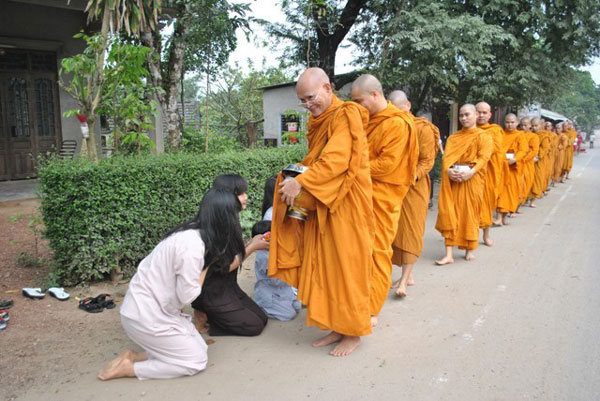In Buddhism, karma refers to the concept that intentional actions, whether good or bad, have corresponding future consequences. This principle of moral causation underscores the belief that ethical behavior leads to future happiness, while unethical behavior results in suffering.
Karma is seen as a natural law of the moral universe, guiding individuals on their path to enlightenment, shaping their destinies according to their deeds.
Meaning of Karma in Buddhism
Karma is a vital concept in Buddhism, deeply rooted in the idea that our actions have consequences. The word comes from the Sanskrit “kri,” meaning “to do” or “to act.” It encompasses more than just physical deeds; it includes thoughts and emotions, too, painting a complete picture of how every aspect of our behavior impacts our lives.
Karma is about the universal law of cause and effect. It suggests that what we do in this life, and possibly in past lives, shapes our future. This isn’t just about what happens to us externally, but also about our inner growth and spiritual journey.
Ethically, karma is a call to live responsibly and rightly. It suggests that the differences we see in the world, like why some people experience more joy or suffering than others, aren’t random or due to the whims of some higher power. Instead, these differences are often the results of our own actions.
In the cycle of reincarnation, karma plays a crucial role. It’s believed that after death, a person’s soul is reborn, and the life they lead in this new existence is influenced by their previous actions. This cycle, known as “samsara”, goes on until one achieves enlightenment or liberation (“moksha”).
Buddhism teaches that by cultivating positive karma through virtuous actions, compassion, and wisdom, we pave the way for a future of happiness and enlightenment. Conversely, negative karma, accrued through harmful actions, leads to future suffering. Thus, karma is a central pillar in the Buddhist path, offering a profound incentive to live with awareness and kindness in every moment.
How Does Karma Work?
To grasp how karma functions, imagine it as a cosmic principle intertwining with rebirth, ethical cause and effect, and the quest for spiritual freedom.
Think of karma as a series of ripples created by every one of our actions, words, and even thoughts. Each ripple, big or small, sets off a chain reaction, leading to outcomes. These outcomes might show up right away or take years, maybe even popping up in a future life.
Karma isn’t about punishment or reward. It’s more like a natural process where the intent behind our actions plays a key role. For instance, if you help someone with a genuine desire to do good, even if things don’t turn out perfectly, it’s still considered positive karma. On the flip side, if an action is driven by harmful intentions, it could result in negative karma.
Imagine your life as a savings account of karma. Every action deposits or withdraws karma, shaping your life’s blueprint. This “karmic account” influences many aspects of your life, like health, success, or difficulties you face. So, the varied life experiences we see aren’t just random but are influenced by each person’s karmic history.
But karma isn’t a fixed fate. It empowers us with free will and moral responsibility. Your actions today can change your karmic balance, affecting your future and steering your spiritual journey.
The ultimate aim in many Eastern philosophies is to break free from the cycle of birth and death, achieving a state like moksha or nirvana. This liberation is reached when you’ve settled all your karmic debts. In Buddhism, for example, following the Noble Eightfold Path can lead to the end of desires and, consequently, the end of creating new karma.
So, karma works like a complex web of actions and reactions, guiding the journey of our souls through various lives, with the final goal being spiritual liberation.
Is Karma Real?
The idea of karma, originating in Eastern traditions like Hinduism, Buddhism, Jainism, and Sikhism, holds a significant place for those who follow these paths. In these beliefs, karma is seen as a fundamental universal law: every action has a consequence, playing a crucial role in understanding life, suffering, and the journey to spiritual freedom.
In Western culture, karma has become a familiar term, though often simplified to mean “what you give is what you get.” Some people view this as an expression of a moral universe where actions, good or bad, eventually find their due reward or punishment.
From a scientific standpoint, however, karma’s existence, especially in the context of reincarnation and past actions affecting future lives, isn’t something that can be empirically proven. Science focuses on what can be observed and measured, and karma, being a metaphysical concept, falls outside this scope.
Psychologically, there are aspects of the karma concept that resonate with known phenomena. The “just-world hypothesis,” for example, is a cognitive bias where people believe the world is fair and everyone gets what they deserve. Ethical behavior also tends to bring positive social responses and internal psychological rewards, somewhat akin to the idea of “good karma.”
In philosophical and ethical discussions, while not proving karma as a metaphysical truth, the idea is often linked to notions of cause and effect, moral accountability, and justice. These connections don’t confirm the existence of karma in a spiritual sense but do underscore its value as a tool for moral reflection and ethical choices.
Types of Karma
Karma like various strands in a vast web of actions and their outcomes. These types help us understand how our past, present, and future are interconnected.
- Sanchita Karma: Picture a vast reservoir containing all the karma you’ve collected over countless past lives. It’s like a bank of actions waiting to unfold or come to fruition. This is your accumulated karma, a sum of your past that’s not yet impacted your present.
- Prarabdha Karma: This is the part of your Sanchita Karma that’s active right now, shaping your current life. It’s like the script of your life story, setting up your birth conditions, natural inclinations, and life’s challenges and opportunities. Think of it as your “fate” or “destiny,” a portion of your past karma that’s playing out and is mostly fixed.
- Kriyamana or Agami Karma: This type represents the fresh karma you’re creating through your current actions. It’s like planting seeds that will grow in the future, either in this life or in future ones, adding to your Sanchita Karma.
- Vikarma or Paap Karma: Vikarma is about actions that harm or go against moral values. These negative actions are believed to bring negative consequences.
- Akarma or Punya Karma: In contrast, Akarma involves selfless deeds done without expecting anything in return. These actions are thought to accumulate positive karma.
In Buddhism, karma is also split based on when you’ll feel its effects:
- Dittadhammavedaniya Karma: This is karma you experience in your current life.
- Upapajjavedaniya Karma: This is karma that will affect your next life.
- Aparapariyavedaniya Karma: This is karma whose results you’ll see in lives beyond your next one.
These categories help us navigate the complex idea of karma. They show us how our actions ripple through time, influencing our lives and spiritual journeys. While we can’t always escape the effects of past actions, the idea of karma stresses the power of our current choices. By acting ethically and selflessly, we can steer our karmic path toward spiritual freedom, using these types of karma as a guide to understand our past, manage our present, and shape our future.
Examples of Karma in Daily Life
Karma, often thought of in spiritual terms, can actually play out in our everyday lives in simple, yet impactful ways. It’s like seeing the ripple effects of our actions in the here and now.
- In Friendships: Imagine you’re always kind and respectful to your friends. More often than not, they’ll respond in kind, leading to stronger, happier friendships. On the flip side, if you’re often dishonest or mean, don’t be surprised if friends keep their distance or if you find yourself in frequent arguments.
- At Work: Think about an employee who’s hardworking, honest, and supportive of their colleagues. Chances are, they’ll be well-regarded and might even get promoted. But if someone is lazy, creates trouble, or is dishonest, they could end up reprimanded or even lose their job.
- Health and Lifestyle: This one’s straightforward. If you exercise regularly, eat well, and get enough sleep, your body will likely reward you with good health. Neglect these, and your health might suffer.
- Caring for the Environment: In a community that throws away trash properly, recycles, and looks after nature, the environment stays clean and healthy. But if people litter and ignore the environment, pollution and health problems could follow.
- Studying and Learning: A student who puts in the effort, studying regularly and engaging in class, usually sees good grades and gains knowledge. If a student ignores their studies, poor grades and a lack of understanding are often the results.
- Handling Emotions: Continuously fostering positive emotions like gratitude and optimism can lead to a happier, more content life. In contrast, dwelling on negativity can increase stress and unhappiness.
These everyday examples reflect a basic understanding of karma – the idea that our actions have direct consequences. While this doesn’t cover the entire depth of karma as it’s seen in Eastern philosophies, where actions have moral weight and consequences that can span lifetimes, it does give a glimpse into how the principle of cause and effect plays out in our daily lives.
How to Accumulate Good Karma According Buddhism
Accumulating good karma, or “merit,” in Buddhism is closely linked to the intentional cultivation of ethical conduct, wisdom, and compassion. Buddhist teachings, including the Noble Eightfold Path and Five Precepts, offer guidance on living a virtuous life that contributes to good karma. But you have to note that in Buddhism, the ultimate goal is not merely the accumulation of good karma, but rather the cessation of the cycle of karma and liberation from the samsara, leading to Nirvana.
- Following the Five Precepts: These fundamental ethical guidelines advocate refraining from taking life, stealing, sexual misconduct, lying, and intoxication. Adherence to these precepts helps individuals cultivate moral discipline, thereby reducing harmful actions and generating good karma.
- Practicing the Noble Eightfold Path: This path provides comprehensive guidance for moral and spiritual development. It includes right understanding, right intention, right speech, right action, right livelihood, right effort, right mindfulness, and right concentration. These elements are interdependent and together they contribute to the cultivation of wisdom, ethical conduct, and mental discipline, leading to the cessation of suffering and the accumulation of good karma.
- Cultivating Metta and Compassion: Metta, or loving-kindness, and compassion are essential aspects of Buddhist practice. Cultivating an attitude of goodwill towards oneself and others, along with empathetic understanding of the suffering of others, contributes to positive actions and, in turn, generates good karma.
- Generosity (Dana): Acts of giving, whether it be material support, time, or knowledge, is a fundamental practice in Buddhism. It helps cultivate non-attachment and generosity, thus contributing to the accumulation of good karma.
- Mindfulness and Meditation: Being mindful of one’s thoughts, words, and actions helps one to act intentionally, reducing harmful impulses and promoting beneficial actions. Meditation aids in developing insight and understanding the true nature of reality, thereby minimizing unwholesome actions and generating good karma.
- Pursuit of Wisdom (Prajna): Wisdom in Buddhism is the understanding of the Four Noble Truths – the truth of suffering, its cause, its cessation, and the path leading to its cessation. This understanding aids in making choices that align with the path of liberation, thereby resulting in the accumulation of good karma.
While these practices contribute to the accumulation of good karma, it’s crucial to remember that Buddhism emphasizes intention or volition behind actions. Merely performing good deeds without the right intention may not necessarily yield good karma. Similarly, a seemingly negative action performed with a good intention could yield positive karmic results.
Buddhist practice encourages individuals not to be attached to the fruits of their actions, but instead to focus on acting rightly for its own sake. This non-attached action, combined with the cultivation of wisdom and compassion, serves as the path towards liberating oneself from the cycle of karma and achieving Nirvana.
Can Karma be Changed or Erased?
In Eastern philosophical traditions such as Hinduism, Buddhism, Jainism and Sikhism, karma is not perceived as a predetermined fate that an individual is powerless against, but rather as a complex and dynamic process, influenced by one’s actions and intentions. This allows for the potential to transform one’s karma.
However, you must to clarify that changing or “erasing” karma does not mean evading the consequences of one’s actions or achieving absolution without addressing the harmful actions committed. Instead, it involves the active process of acknowledging and learning from past mistakes, making amends, and engaging in ethical behavior and spiritual practices to transform one’s pattern of actions.
How to Reverse Bad Karma
Dealing with “bad karma,” the negative fallout from past actions, involves a mix of understanding, introspection, remorse, making things right, and actively doing good. Different Eastern teachings have their own ways to handle this, but they share common themes.
First, grasp what karma really is. It’s not a fixed fate; your current actions can shape what’s to come. Understanding this can empower you to change your path.
Recognizing where you’ve gone wrong is crucial. Feeling true regret is the first step in stopping harmful behaviors. In Buddhism, this idea is part of a method to cleanse bad karma.
Then, try to fix the harm you’ve caused. This could mean apologizing to someone you’ve hurt or doing positive things to balance out past wrongs.
Building up good qualities is key. Both Buddhism and Hinduism stress living ethically, like following Buddhism’s Five Precepts or Hinduism’s Yamas and Niyamas. Embrace qualities like generosity, patience, and kindness to gather good karma.
Mindfulness and meditation can also guide you. Being mindful helps you watch your actions more closely, avoiding negative behavior. Meditation, especially loving-kindness (Metta) and insight (Vipassana) meditation, can reshape your mind and encourage positive thoughts.
Sometimes, guidance from a spiritual teacher can be really helpful. They can offer support and advice in your journey to overcome negative karma.
There are also specific practices suggested for clearing bad karma. In Buddhism, for example, the Vajrasattva mantra meditation is often recommended. Hinduism suggests methods like chanting mantras, participating in fire ceremonies, and doing selfless acts.
Remember, the goal isn’t just to dodge the consequences of past actions. It’s about learning, growing, and evolving spiritually. By embracing karma’s principles, you can change your behavior and set yourself on a path toward spiritual freedom.
- Tip: If you want to know more about how to reverse negative karma, you can refer to this article: https://lotusbuddhas.com/10-ways-to-reverse-your-bad-karma.html
Good Quotes About Karma
Here are several notable quotes on the concept of karma from various sources:
- “As she has planted, so does she harvest; such is the field of karma.” – Sri Guru Granth Sahib.
This quote from the Sikh scripture underscores the principle of cause and effect, likening karma to a field where the seeds of actions are sown, and the corresponding fruits are harvested. - “Just as a snake sheds its skin, we must shed our past over and over again.” – Shakyamuni Buddha.
Although not explicitly mentioning karma, this quote from the Buddha conveys the idea of continually letting go of past actions (and their karmic effects), emphasizing the importance of continual growth and transformation. - “Like gravity, karma is so basic we often don’t even notice it.” – Sakyong Mipham.
This contemporary Tibetan Buddhist teacher draws a parallel between karma and fundamental physical laws, hinting at its pervasive, yet often overlooked, influence. - “If you want to know your past life, look into your present condition; if you want to know your future life, look at your present actions.” – Padmasambhava.
This quote from the 8th-century Buddhist master Padmasambhava encapsulates the continuity of karma across past, present, and future. - “Karma moves in two directions. If we act virtuously, the seed we plant will result in happiness. If we act non-virtuously, suffering results.” – Sakyong Mipham.
This quote again from Sakyong Mipham elucidates the ethical dimension of karma, tying the nature of our actions to corresponding outcomes of happiness or suffering. - “Karma, when properly understood, is just the mechanics through which consciousness manifests.” – Deepak Chopra.
Deepak Chopra, an author known for blending Eastern and Western philosophical ideas, interprets karma as a process that bridges consciousness and the manifest world. - “You have no control over the results, only your actions.” – Bhagavad Gita.
Although the term karma isn’t explicitly used in this quote, it’s a cornerstone concept of the Bhagavad Gita, an important text in Hindu philosophy. This quote emphasizes the importance of focusing on right action, rather than becoming attached to the results of those actions.
In summary, the concept of karma, pivotal in Buddhist thought, represents a complex network of cause and effect, eluding simple explanations. It forms an intricate tapestry of actions and their interconnected consequences, influenced by numerous variables beyond complete understanding. Karma transcends straightforward notions of time and causation, reflecting Buddhism’s deep exploration of spiritual and moral dimensions.
The task of pinpointing exact outcomes from specific deeds is nearly impossible, akin to forecasting the precise path of a leaf on a stormy sea. This not only underscores the subjective and unpredictable nature of karma but also cautions against oversimplifying it into a mere system of give-and-take.
The essence of comprehending karma lies in recognizing its profound ethical and spiritual ramifications, rather than in anticipating exact returns. It’s about realizing the transformative power inherent in our choices and our ethical duty in molding our fate and influencing others.
Confronting karma’s complexity brings us face to face with a core Buddhist insight: the deep interconnection and mutual reliance of all existence. The enigmatic nature of karma accentuates life’s intricacies and the subtle dynamics of cause and effect that thread through our experiences. Thus, karma serves not only as a cosmic rule but also as an impetus for mindful and ethical living, steering us towards navigating life’s challenges with insight and empathy.
Reference:
- Buddhism, Science, and the Truth About Karma: https://www.researchgate.net/publication/261376179_Buddhism_Science_and_the_Truth_About_Karma
- An analysis of the Buddhist doctrines of karma and rebirth in the Visuddhimagga: https://philarchive.org/archive/BARAAO-18











